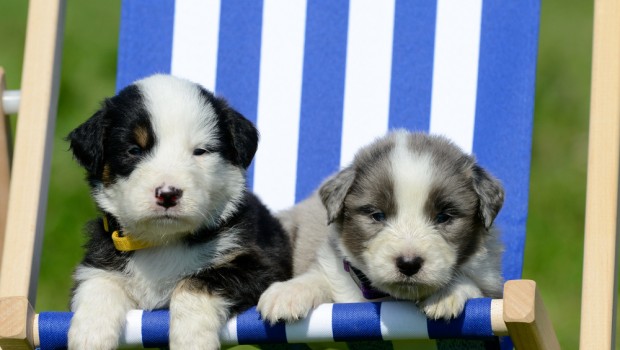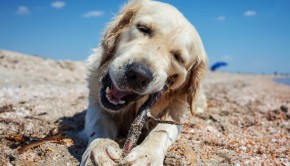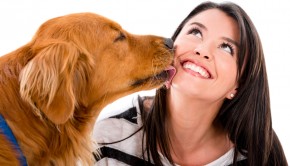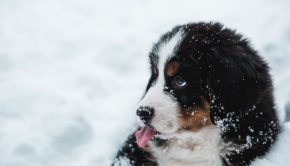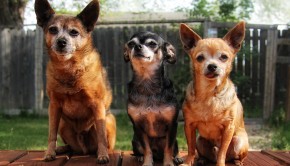Housetraining Your New Puppy
Housetraining seems to be the most common nemesis of all dog owners. Left unsupervised, a puppy can spend months in a home without catching the slightest hint of what housetraining is all about. And if over-supervised and harassed, he may become neurotic and overanxious.
A happy medium does exist, of course, but many pet owners seem unwilling or unable to make the necessary commitments to the tried and true methods established by professional dog trainers. In the long run, a few weeks of effort will result in a truly housetrained pup, with a minimum of effort and strain on both you and your pet.
Housetraining Rule Number 1: Confinement
There are several important factors to consider in housetraining. The first of these factors is confinement in a relatively small area that has an easy-to-clean floor and is not isolated from the rest of the family (using a playpen is perfect). Far from being cruel as most dog owners complain, confinement reassures the young puppy and allows him to become completely familiar with the surroundings without being overwhelmed with the size or complexity of your entire home.
Confinement keeps little paws and playful teeth out of range of dangerous places while ensuring that your dog is close to his papers, or the door to the yard, whenever the urge to use the bathroom comes over him. This means he is more likely to behave correctly than to have an accident, which results in lots of praise and affection from you.
Praise
And that is the second important factor in housetraining: praise. Your praise and approval are more important to your puppy than practically anything else in his life. A mere scowl out of anger can start him sulking in sadness while a pat on the head or a few kind words will set his tail wagging and put a big smile on his little face. Young puppies respond much more quickly and effectively to praise and encouragement than they do the physical correction. Therefore, we believe that there is no place for physical punishment for any puppy.
Consistency
Consistency is the third vital factor in housetraining. Consistency in the schedule, in feeding habits, in praise and reward for proper behavior and in verbal reprimand when accidents occur, is of supreme importance.
Scolding occasionally for accidents but ignoring others, feeding at irregular intervals, lack of praise for soiling on the dog’s papers or in the yard: all will only serve to confuse and discourage your puppy. So be consistent and have total awareness: your awareness of your puppy’s whereabouts, his needs and urges, and his signals informing you of what’s on his mind.
When initiating housetraining, always keep in mind that until a puppy is 7 months old, his control over excretory functions is extremely limited. At least once per hour, and possibly more often, he will have to relieve himself.
These urges are even more pronounced after sleeping, eating, and playing. By keeping the puppy confined to a relatively small area lined with papers, you will assure that he does not have the opportunity to make a mistake and necessitate verbal reprimand. He will naturally seek the place furthest from his sleeping quarters to soil so that he may keep his own bed clean.
Therefore, take this cue and, after he naps, eats or plays, place him on his papers or outside in the yard. When your puppy soils where you have placed him, praise the dog immensely but make it sincere. Unconvincing praise doesn’t fool anyone, even an eight-week-old puppy.
And as a side note, apartment dwellers and owners who are away at work all day are generally are more successful paper-training a puppy until he is old enough to have considerable control.
Keep Supervision Tight For The Free-Roaming Puppy
If the puppy is allowed to roam about other areas of the house, be sure he is carefully supervised. Should he lower his head, sniff and begin to circle, be quick! Get him onto his papers or into the yard immediately. When he relieves himself, praise, and lots of it, is in order. However, if, through your fault, he has an accident, no spanking or rubbing his nose in it, please!
Such punishment does not fit the crime, being too degrading and encouraging such habits as stool eating (and thereby re-infestation with parasites). By all means show him what he has done, scold him and place him on the papers. But remember, the accident was your fault for not supervising him properly or not being aware of his warning signals, so go easy on him. Be sure that the soiled area is carefully cleaned, deodorized and disinfected as any remaining scent will surely prompt him to return to that very spot when the urge next hits him.
Housetrain Older Dogs The Same As You Would A Young Puppy
For the older dog, paper training is generally superfluous. Regular outings timed to coincide with his peak urgency periods (which, by the way, are the same as a young puppy’s: after meals, naps, and play periods) should accomplish training in short order. While confinement to a very small area is probably unnecessary, supervision and praise must never be forgotten. They are the magic ‘tricks’ to housetraining any dog.

